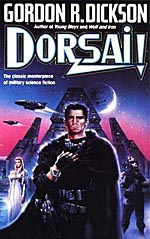
![]() Sable Aradia
Sable Aradia
11/6/2015
![]()
No modern reader will seek this book out unless someone tells them they should. So I'm telling you, you should. I only knew about this book because I'm a genuine article geek and I have listened to filk music that was written about it. When I saw a dusty, archaic copy in an old bookstore that was closing, I snapped it up. No regrets.
A reader of sci-fi will start reading this book and recognize the essential plot of Frank Herbert's classic Dune. Which might make you shake your head at plagiarism; except that this book was published five years before Dune was. So if there was plagiarism, it was the other way around. It's also one of the foundational books of military science fiction, though no one will ever tell you that when they list sources. I think that's a crying shame.
Dickson has a deceptive sort of writing style. Others have criticized it as being terribly simple. And it is, but if that's all you think of it, that tells me you didn't get it. Dickson's prose is an elegant masterpiece of minimalism. Reading him is like appreciating a classical Japanese painting. He does nothing that is of no use. He manages to tell the story in perhaps a third of the word-count of Dune, and nothing is missed and there's not a single moment of boredom. Dickson displays a wide-ranging intuitive grasp of politics, war and philosophy, and the interplay between the three. Also, it's damn good space opera.
Modern readers may find it a little irritating that, as with most books of the time period, the purpose of the women in the story seems to be to improve the men. But that was a standard of the time and I would urge you not to allow that to ruin your enjoyment of a great story.
Other than that I'm not telling you a thing. Go read it.